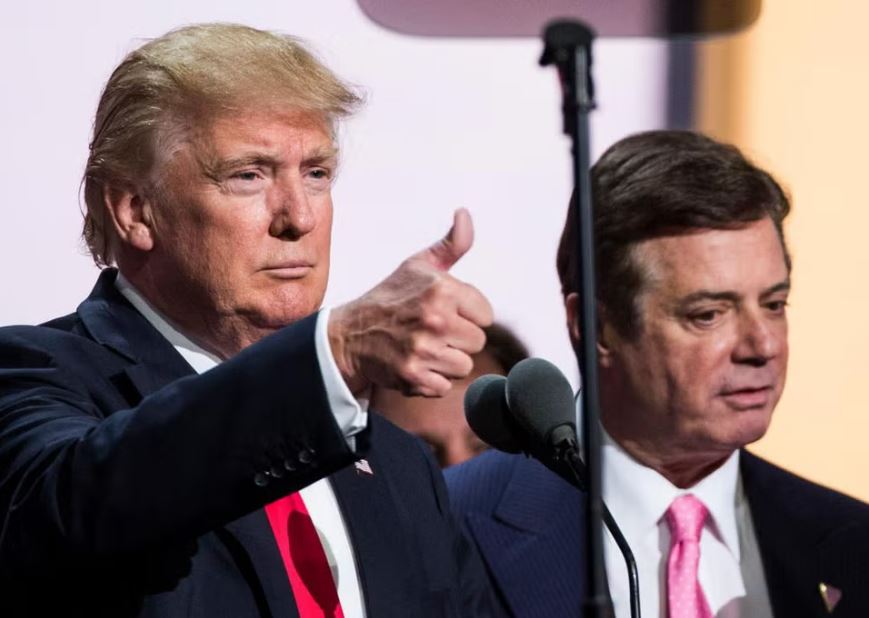Republicans and Russians

Russia’s attempts at interference in American politics aren’t going away. We see only bits and pieces of them, though. most recently, Marjorie Taylor Green was explicitly quoting from Russian and Hungarian propaganda, but she’s not alone.
The effort seems to be distributed across Russian agencies as well, with the FSB (civilian intelligence agency), GRU (military intelligence agency), and probably individual oligarchs and other government agencies reaching for some of their own advantage.
The interference varies over time, as well. The NRA was a focus, now not so much as the organization self-immolates.
Donald Trump and Paul Manafort, however, have been connected to Russia for a long time. Trump has been fascinated by Russia since the 1980s, and the Mueller Report makes clear his more recent ties. There is also Kevin McCarthy’s famous quote about Dana Rohrabacher and Trump being two who are likely paid by Russia.
Paul Manafort started working for the Republican Party in the mid-1970s and was involved in presidential campaigns. His involvement with foreign leaders began with Jonas Savimbi of Angola in 1985. (I am getting dates from Manafort’s Wikipedia article, which should be reasonably accurate.)
Manafort’s involvement with Ukraine starts in 2003 with Oleg Deripaska, who was sanctioned by Trump’s Treasury Department in 2018.. Then he advised Viktor Yanukovych and his Party of Regions from 2004 to 2010. Yanukovych was the Kremlin’s man in Ukraine. Manafort during this time also had business connections with several Ukrainian oligarchs. A continuing connection is Konstantin Kilimnik, now sanctioned and wanted by the FBI. Some of these connections remain current.
Manafort offered his services as campaign manager in 2016 to Trump for no salary, and Trump accepted them. One of Manafort’s achievements in that post was to remove support for Ukraine from the Republican platform. In 2017 and 2018, Manafort was indicted for a number of crimes, some of them related to the Mueller investigation. He was found guilty of conspiring against the United States and witness tampering and sent to prison. In December 2020, Trump pardoned him.
And now Manafort is likely to return to Trump’s campaign. Todd Blanche, one of Trump’s lawyers in his ongoing trial, also represented Manafort.
There’s a lot more that would be desirable to know about Manafort’s operations in Ukraine and his connections to Russian intelligence. Kilimnik may have sent polling and other election data back to Russia during Trump’s 2016 campaign. How much Trump understands and approves of those connections would also be good to know. More of Manafort’s backstory from Josh Kovensky, who covered him in Ukraine and says he feels there’s a lot he doesn’t know. A timeline through 2017 by Kate Brannen.
By December 2016, the CIA assessed that Russia had intervened in the election in favor of Trump. This week, the Washington Post reports on a document from the Russian Ministry of Foreign Affairs calls for an “offensive information campaign” to weaken the United States.
The blocking of aid to Ukraine by a minority of Republican Representatives in the House continues this campaign. Trump has instructed them to block aid to Ukraine, but there seems to be an additional animus among a part of the Republican Party toward Ukraine. Mike Johnson split with Trump to bring the measure to a vote. 112 Repubicans voted against it.
A few Republicans are calling out other Republicans for being influenced by Russian propaganda. Heather Cox Richardson has a good summary.
Media and lawmakers, including those in the Republican Party, have increasingly called out the degree to which Russian propaganda has infiltrated American politics through Republican lawmakers and media figures. Earlier this month, both Representative Michael R. Turner (R-OH), chair of the House Intelligence Committee, and Representative Michael McCaul (R-TX), chair of the House Foreign Affairs Committee, warned about Russian disinformation in their party. Turner told CNN’s State of the Union that it is “absolutely true” that Republican members of Congress are parroting Russian propaganda. “We see directly coming from Russia attempts to mask communications that are anti-Ukraine and pro-Russia messages, some of which we even hear being uttered on the House floor.” When asked which Republicans had fallen to Russian propaganda, McCaul answered that it is “obvious.”
Washington Post also took note. Dan Crenshaw (R TX-2) also accused unnamed Republicans of being taken in by Russian propaganda.
It’s encouraging that a few Republicans are calling Russian influence out. We need more to do so.
Bonus article, only slightly related: Stephen Kotkin on Russia’s future.
Cross-posted to Nuclear Diner


